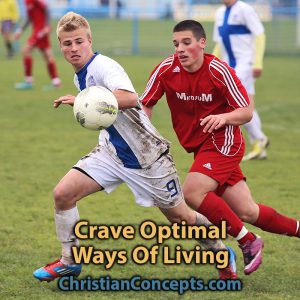Reading time: 4 minutes
In the familiar Matthew 6 passage, I’ve replaced “treasure” with “value.”
“Do not store up for yourselves [value] on earth, where moths and vermin destroy, and where thieves break in and steal. But store up for yourselves [value] in heaven, where moths and vermin do not destroy, and where thieves do not break in and steal. For where your [value] is, there your heart will be also.”
Matthew 6:19-21 NIV
This passage teaches us to value what will last forever over what can be lost. Later in verse 24, it teaches that a person cannot serve both God and money. However, just because you don’t serve money, doesn’t mean you automatically value the right things in the right ways. Do you value God and yourself in the right way?
God’s Value of You is Constant
To value yourself and God appropriately first requires understanding God’s perspective on life. Life moves through four phases, segmented by physical and spiritual birth and death:
- God knew who you were before you were born. He’d have to in order to create you.
- God also knew you while you were alienated from Him in sin.
- God knows who you are as a member of His spiritual family. Believers are God’s children.
- Finally, God knows who you will be when you are in heaven.
God’s perspective on who you are will always be different than your perspective. God sees your life in full from beginning to end (though eternal life has no end). You, however, can only become gradually aware of who you are.
God is a constant. His character is perfect and stable. He is the same today as He was in eternity past and the same as He will be in the future. Even though God’s character doesn’t change, He is still open to relationships. He has feelings about His creation. He is moved with compassion.
But we are made in God’s image, not the other way around. We share some characteristics of God, but He will always have more because He is God and we are not. God’s ways are higher than our ways. He is always several steps ahead of us.
God is love. If God is constant, then so is His love. What does this mean for you? It’s possible to break free from anxious moments. No matter how low you’ve been in life, God’s plan of redemption will eventually bring you higher. Your worth is based on who you are, not what you’ve done. You can change and leave the past behind.
Your Value of You is Changing
Your memories begin much later than God’s. From your perspective, you start out of God’s favor and must become in His favor. Before becoming a Christian, all you know is an antagonistic (at worst) or an indifferent (at best) relationship with God. Your start in debt. You are helpless to save yourself. You will be indebted to God for saving your life.
The prodigal son returned to God not with the attitude of a son, but as a lowly person undeserving of God’s goodness toward those He favors. The father treated his son as a son. The prodigal didn’t refuse his father’s offer. He went to the party his father threw for him. Read Luke 15:11-32 for the whole story.
Over the course of the story, the prodigal’s opinion of himself changed from “high apart from God” to “low apart from God” to “humble but accepting of God’s favor.” We can infer that he eventually felt overwhelmingly positive about himself because of God’s love.
Can you see how you are going through the same journey? How far along are you in accepting God’s favor? When life goes well, it’s easy to be over-confident. Prideful people believe that they don’t need God. One way or another life brings prideful people low. In a moment of weakness, it is a gift for people can recognize their need for God.
A person dependent upon God will develop genuine confidence that is balanced. You can have high self-worth if you base your worth on what God says about you. The truth of what God says will set you free from self-doubt.
What are some self-doubting beliefs that are holding you back from living your life with greatness? God doesn’t want you to live oppressed. That’s the work of the devil. God doesn’t want you to live arrogantly either, unable to see that all good things come from Him. That would also be the devil’s work.
God wants you to know your incredible value and know His incredible value. When you truly value both, you’ll be unstoppable.
Read more about discovering your worth.
Image by Peggy und Marco Lachmann-Anke from Pixabay






